This deals with inserting treasures in random maps. More...

Go to the source code of this file.
Data Structures | |
| struct | free_spots_struct |
| Datastructure needed by find_spot_in_room() and find_spot_in_room_recursive() More... | |
Defines | |
| #define | CONCENTRATED 1 /* all the treasure is at the C's for onions. */ |
| #define | DOORED 8 /* treasure has doors around it. */ |
| #define | FILLED 128 /* Fill/tile the entire map with treasure */ |
| #define | HIDDEN 2 /* doors to treasure are hidden. */ |
| #define | KEYREQUIRED 4 /* chest has a key, which is placed randomly in the map. */ |
| #define | LAST_OPTION 64 /* set this to the last real option, for random */ |
| #define | NO_PASS_DOORS 0 |
| #define | PASS_DOORS 1 |
| #define | RICH 64 /* 2x as much treasure as default */ |
| #define | SPARSE 32 /* 1/2 as much treasure as default */ |
| #define | TRAPPED 16 /* trap dropped in same location as chest. */ |
Typedefs | |
| typedef struct free_spots_struct | free_spots_struct |
| Datastructure needed by find_spot_in_room() and find_spot_in_room_recursive() | |
Functions | |
| static object * | door_in_square (mapstruct *map, int x, int y) |
| Returns the first door in this square, or NULL if there isn't a door. | |
| object * | find_closest_monster (mapstruct *map, int x, int y, RMParms *RP) |
| finds the closest monster and returns him, regardless of doors or walls | |
| object ** | find_doors_in_room (mapstruct *map, int x, int y, RMParms *RP) |
| Gets all doors in a room. | |
| void | find_doors_in_room_recursive (char **layout, mapstruct *map, int x, int y, object **doorlist, int *ndoors, RMParms *RP) |
| The workhorse routine, which finds the doors in a room. | |
| void | find_enclosed_spot (mapstruct *map, int *cx, int *cy, RMParms *RP) |
| Searches the map for a spot with walls around it. | |
| object * | find_monster_in_room (mapstruct *map, int x, int y, RMParms *RP) |
| Find a monster in a room. | |
| object * | find_monster_in_room_recursive (char **layout, mapstruct *map, int x, int y, RMParms *RP) |
| A recursive routine which will return a monster, eventually, if there is one. | |
| int | find_spot_in_room (mapstruct *map, int x, int y, int *kx, int *ky, RMParms *RP) |
| Find a random non-blocked spot in this room to drop a key. | |
| static void | find_spot_in_room_recursive (char **layout, int x, int y, RMParms *RP, free_spots_struct *spots) |
| the workhorse routine, which finds the free spots in a room: a datastructure of free points is set up, and a position chosen from that datastructure. | |
| int | keyplace (mapstruct *map, int x, int y, char *keycode, int door_flag, int n_keys, RMParms *RP) |
| Places keys in the map, preferably in something alive. | |
| void | lock_and_hide_doors (object **doorlist, mapstruct *map, int opts, RMParms *RP) |
| Locks and/or hides all the doors in doorlist, or does nothing if opts doesn't say to lock/hide doors. | |
| object * | place_chest (int treasureoptions, int x, int y, mapstruct *map, mapstruct *style_map, int n_treasures, RMParms *RP) |
| Put a chest into the map. | |
| void | place_treasure (mapstruct *map, char **layout, char *treasure_style, int treasureoptions, RMParms *RP) |
| Place treasures in the map. | |
| static void | remove_adjacent_doors (object *door) |
| This removes any 'normal' doors around the specified door. | |
| void | remove_monsters (int x, int y, mapstruct *map) |
| Remove living things on specified spot. | |
| static object ** | surround_by_doors (mapstruct *map, char **layout, int x, int y, int opts) |
| Surrounds the point x,y by doors, so as to enclose something, like a chest. | |
| int | wall_blocked (mapstruct *m, int x, int y) |
| Returns true if square x,y has P_NO_PASS set, which is true for walls and doors but not monsters. | |
Detailed Description
This deals with inserting treasures in random maps.
Definition in file treasure.c.
Define Documentation
| #define NO_PASS_DOORS 0 |
Definition at line 57 of file treasure.c.
Referenced by keyplace(), and lock_and_hide_doors().
| #define PASS_DOORS 1 |
Definition at line 58 of file treasure.c.
Referenced by keyplace(), and place_chest().
Typedef Documentation
| typedef struct free_spots_struct free_spots_struct |
Datastructure needed by find_spot_in_room() and find_spot_in_room_recursive()
Function Documentation
| static object* door_in_square | ( | mapstruct * | map, |
| int | x, | ||
| int | y | ||
| ) | [static] |
Returns the first door in this square, or NULL if there isn't a door.
- Parameters:
-
map x y where to look.
- Returns:
- door, or NULL if none found.
Definition at line 801 of file treasure.c.
References DOOR, GET_MAP_OB, and LOCKED_DOOR.
Referenced by find_doors_in_room_recursive().

| object* find_closest_monster | ( | mapstruct * | map, |
| int | x, | ||
| int | y, | ||
| RMParms * | RP | ||
| ) |
finds the closest monster and returns him, regardless of doors or walls
- Parameters:
-
map x y where to look from. RP parameters for random map.
- Returns:
- monster, or NULL if none found.
- Todo:
- shouldn't it search further away?
Definition at line 311 of file treasure.c.
References FLAG_MONSTER, freearr_x, freearr_y, GET_MAP_FLAGS, GET_MAP_OB, P_IS_ALIVE, QUERY_FLAG, and SIZEOFFREE.
Referenced by keyplace().

| object** find_doors_in_room | ( | mapstruct * | map, |
| int | x, | ||
| int | y, | ||
| RMParms * | RP | ||
| ) |
Gets all doors in a room.
- Parameters:
-
map map to look into. x y point of a room to find door for. RP map parameters.
- Returns:
- door list. Should be free()d be caller. NULL-terminated.
- Todo:
- couldn't layout be given instead of being computed?
Definition at line 871 of file treasure.c.
References find_doors_in_room_recursive(), wall_blocked(), RMParms::Xsize, and RMParms::Ysize.
Referenced by place_treasure().
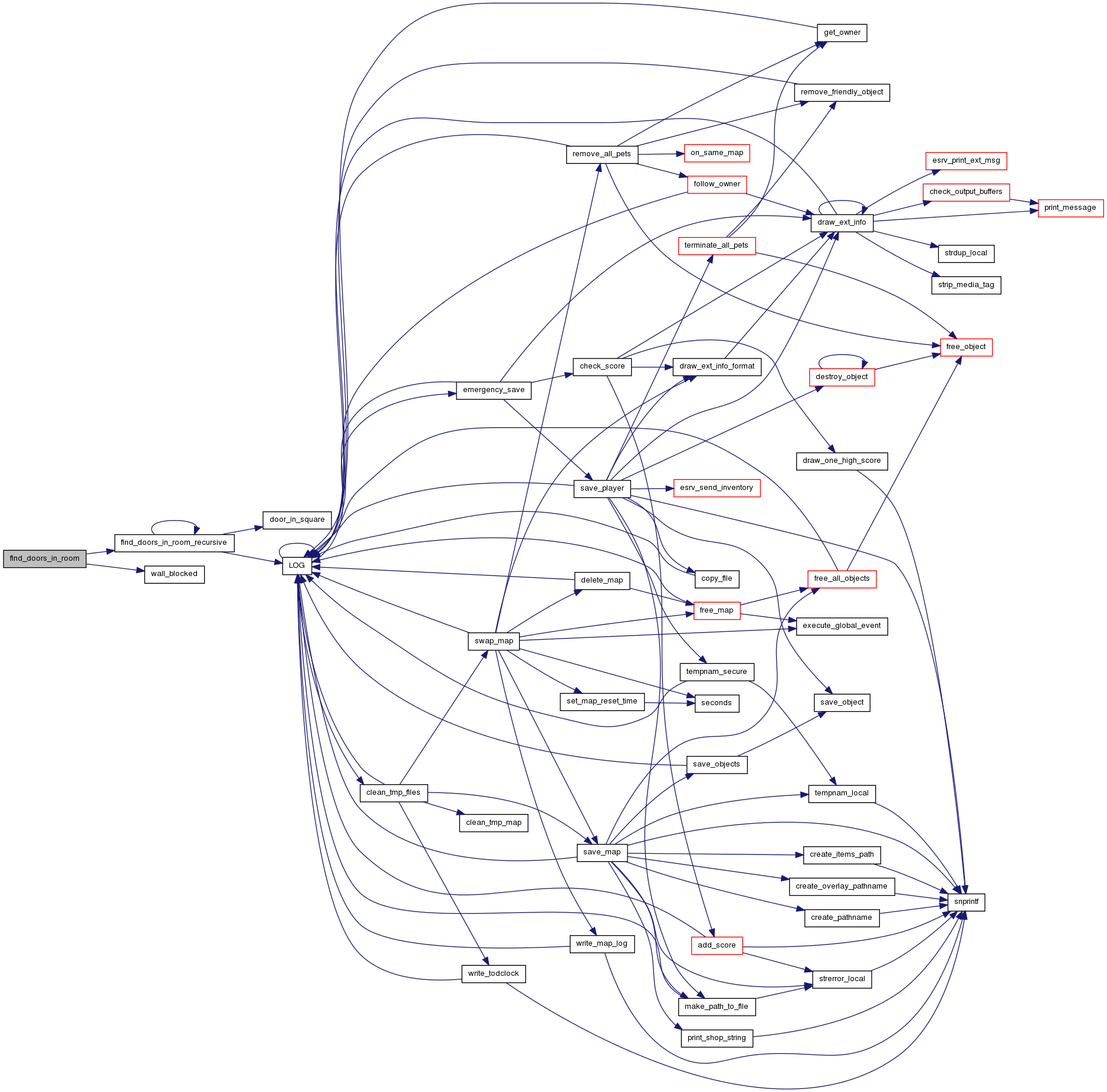
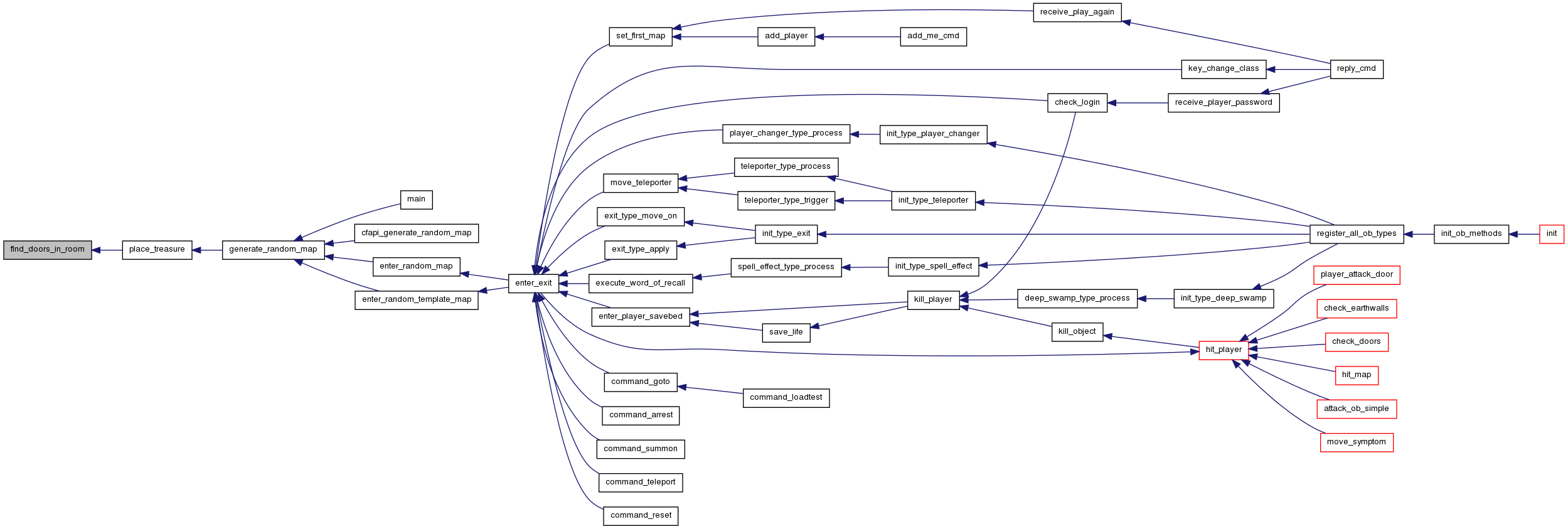
| void find_doors_in_room_recursive | ( | char ** | layout, |
| mapstruct * | map, | ||
| int | x, | ||
| int | y, | ||
| object ** | doorlist, | ||
| int * | ndoors, | ||
| RMParms * | RP | ||
| ) |
The workhorse routine, which finds the doors in a room.
- Parameters:
-
layout map x y random map to look into. doorlist list of doors. ndoors number of found doors. RP map parameters.
Definition at line 824 of file treasure.c.
References door_in_square(), find_doors_in_room_recursive(), freearr_x, freearr_y, llevError, and LOG().
Referenced by find_doors_in_room(), and find_doors_in_room_recursive().
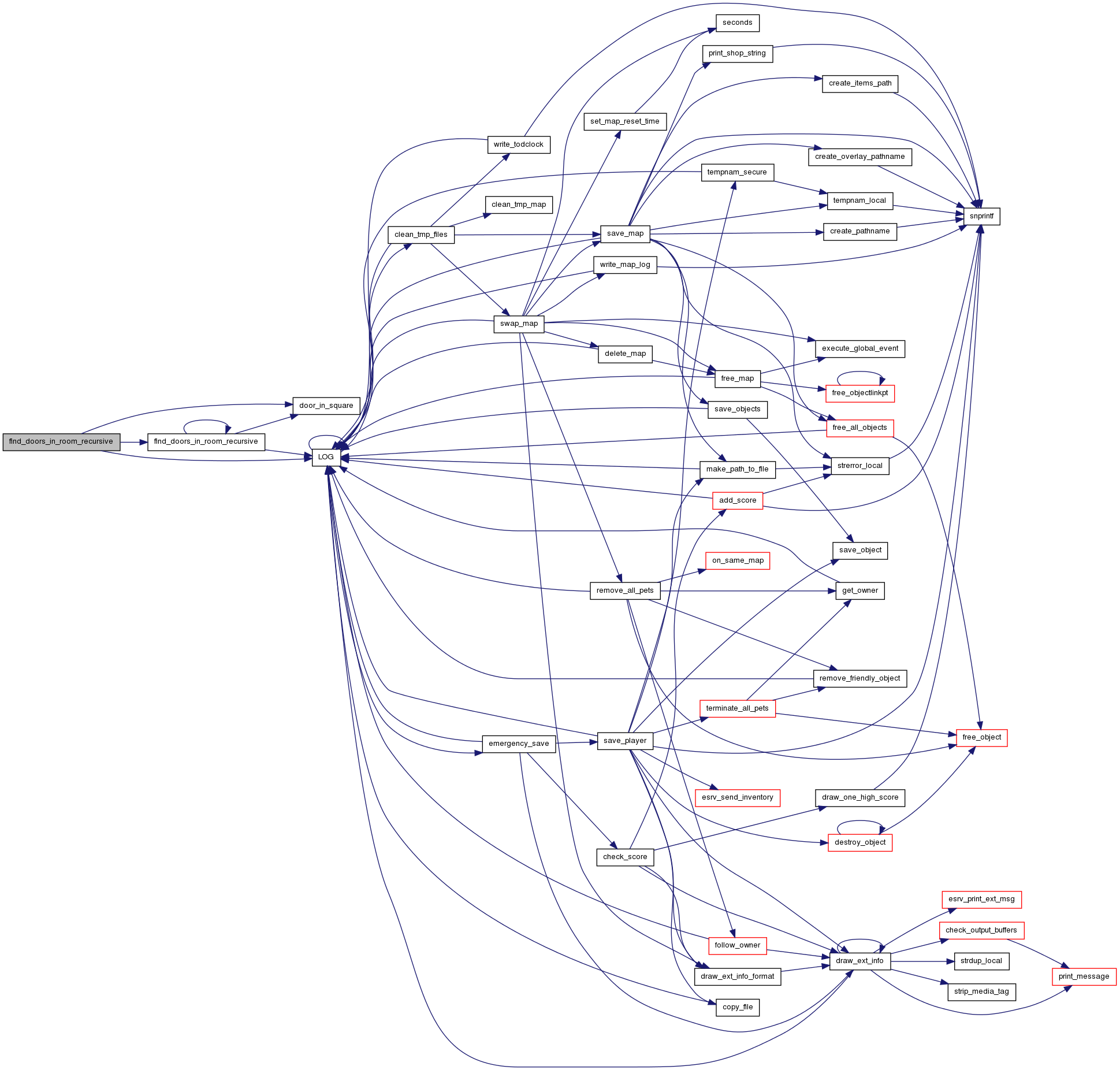

| void find_enclosed_spot | ( | mapstruct * | map, |
| int * | cx, | ||
| int * | cy, | ||
| RMParms * | RP | ||
| ) |
Searches the map for a spot with walls around it.
The more walls the better, but it'll settle for 1 wall, or even 0, but it'll return 0 if no FREE spots are found.
- Parameters:
-
map where to look. cx cy where to look, and coordinates of found spot. -1 if no spot found. RP parameters of the random map.
Definition at line 653 of file treasure.c.
References find_archetype(), find_first_free_spot(), freearr_x, freearr_y, SIZEOFFREE1, and surround_flag3().
Referenced by place_treasure().
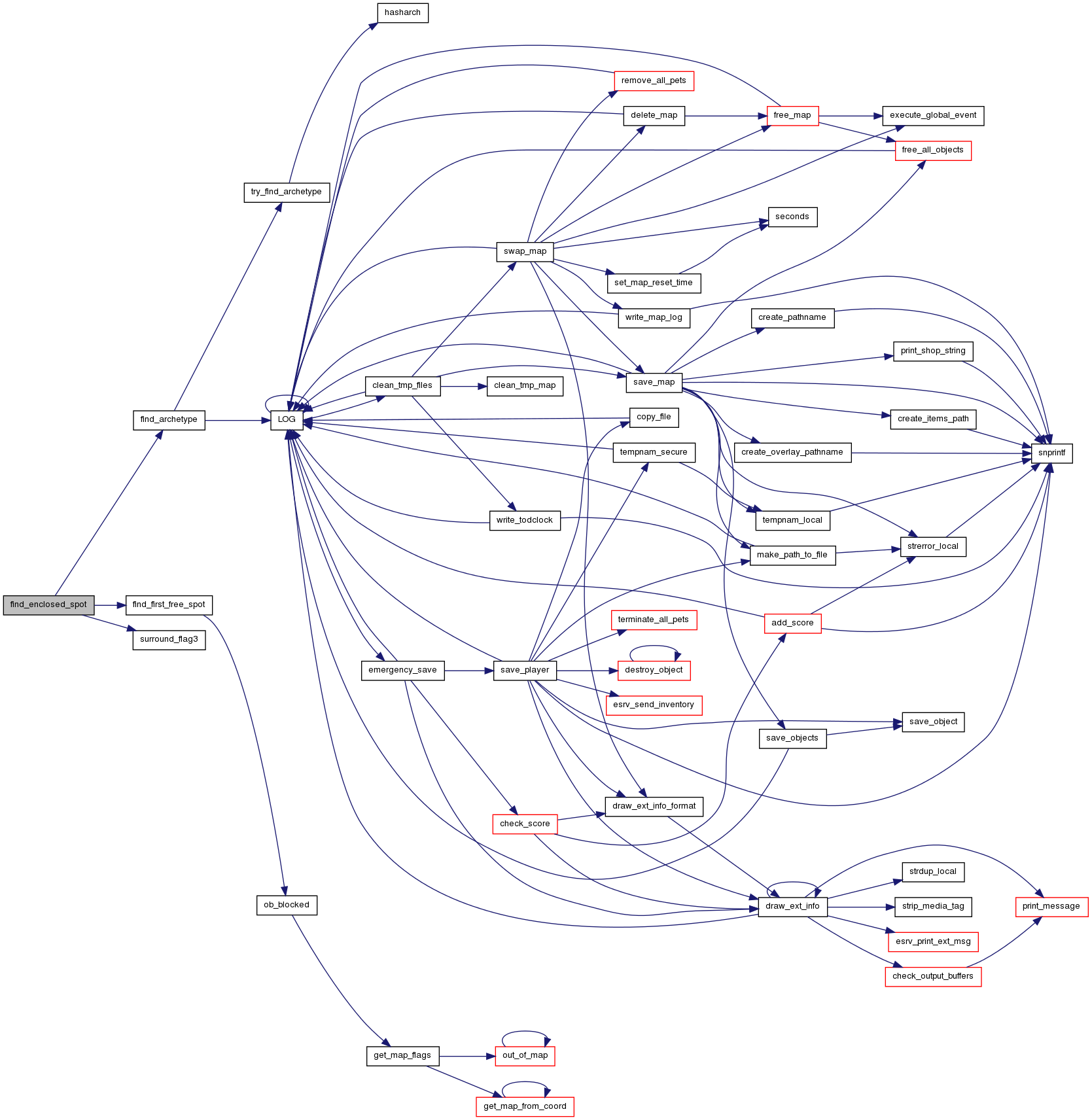
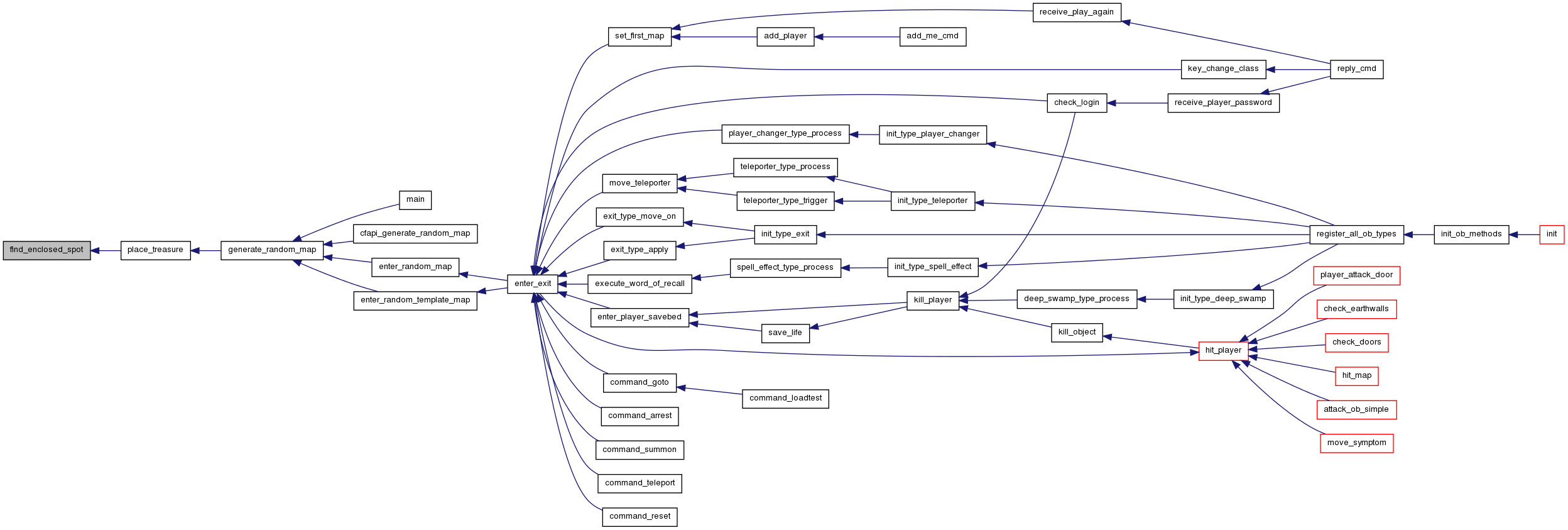
| object* find_monster_in_room | ( | mapstruct * | map, |
| int | x, | ||
| int | y, | ||
| RMParms * | RP | ||
| ) |
Find a monster in a room.
Real work is done by find_monster_in_room_recursive().
- Parameters:
-
map generated map. x y where to look from. RP random map parameters.
- Returns:
- monster, or NULL if none found.
- Todo:
- couldn't the layout be given instead of being calculated?
Definition at line 513 of file treasure.c.
References find_monster_in_room_recursive(), wall_blocked(), RMParms::Xsize, and RMParms::Ysize.
Referenced by keyplace().


| object* find_monster_in_room_recursive | ( | char ** | layout, |
| mapstruct * | map, | ||
| int | x, | ||
| int | y, | ||
| RMParms * | RP | ||
| ) |
A recursive routine which will return a monster, eventually, if there is one.
One should really call find_monster_in_room().
- Parameters:
-
layout map layout. map generated map. x y where to look from. RP random map parameters.
- Returns:
- monster, or NULL if none found.
Definition at line 465 of file treasure.c.
References find_monster_in_room_recursive(), FLAG_ALIVE, freearr_x, freearr_y, GET_MAP_FLAGS, GET_MAP_OB, P_IS_ALIVE, and QUERY_FLAG.
Referenced by find_monster_in_room(), and find_monster_in_room_recursive().


| int find_spot_in_room | ( | mapstruct * | map, |
| int | x, | ||
| int | y, | ||
| int * | kx, | ||
| int * | ky, | ||
| RMParms * | RP | ||
| ) |
Find a random non-blocked spot in this room to drop a key.
Returns 1 if success, 0 else.
- Parameters:
-
map map to look into. x y where to look from. [out] kx [out] ky found spot if 1 is returned. RP random map parameters.
- Returns:
- 1 if spot found, 0 else.
- Todo:
- couldn't layout be given instead of being computed?
Definition at line 600 of file treasure.c.
References find_spot_in_room_recursive(), free_spots_struct::number_of_free_spots_in_room, free_spots_struct::room_free_spots_x, free_spots_struct::room_free_spots_y, wall_blocked(), RMParms::Xsize, and RMParms::Ysize.
Referenced by keyplace().


| static void find_spot_in_room_recursive | ( | char ** | layout, |
| int | x, | ||
| int | y, | ||
| RMParms * | RP, | ||
| free_spots_struct * | spots | ||
| ) | [static] |
the workhorse routine, which finds the free spots in a room: a datastructure of free points is set up, and a position chosen from that datastructure.
- Parameters:
-
layout map layout. x y where to look from. RP random map parameters. spots currently found free spots.
Definition at line 559 of file treasure.c.
References freearr_x, freearr_y, free_spots_struct::number_of_free_spots_in_room, free_spots_struct::room_free_spots_x, and free_spots_struct::room_free_spots_y.
Referenced by find_spot_in_room().

| int keyplace | ( | mapstruct * | map, |
| int | x, | ||
| int | y, | ||
| char * | keycode, | ||
| int | door_flag, | ||
| int | n_keys, | ||
| RMParms * | RP | ||
| ) |
Places keys in the map, preferably in something alive.
The idea is that you call keyplace on x,y where a door is, and it'll make sure a key is placed on both sides of the door.
- Parameters:
-
map x y where to put a key. keycode keycode is the key's code. door_flag if NO_PASS_DOORS won't cross doors or walls to keyplace, PASS_DOORS will. if PASS_DOORS is set, the x & y values that are passed in are basically meaningless - IMO, it is a bit of misnomer, as when it is set, it just randomly chooses spaces on the map, ideally finding a close monster, to put the key in. In fact, if PASS_DOORS is set, there is no guarantee that the keys will be on both sides of the door - it may happen by randomness, but the code doesn't work to make sure it happens. n_keys number of keys to place. If 1, it will place 1 key. Else, it will place 2-4 keys. RP random map parameters.
- Returns:
- 1 if key was successfully placed, 0 else.
Definition at line 361 of file treasure.c.
References add_string(), create_archetype(), distance(), RMParms::dungeon_level, RMParms::dungeon_name, find_closest_monster(), find_first_free_spot(), find_monster_in_room(), find_spot_in_room(), free_string(), freearr_x, freearr_y, insert_ob_in_map(), insert_ob_in_ob(), keyplace(), NO_PASS_DOORS, PASS_DOORS, snprintf(), wall_blocked(), RMParms::Xsize, and RMParms::Ysize.
Referenced by keyplace(), lock_and_hide_doors(), and place_chest().
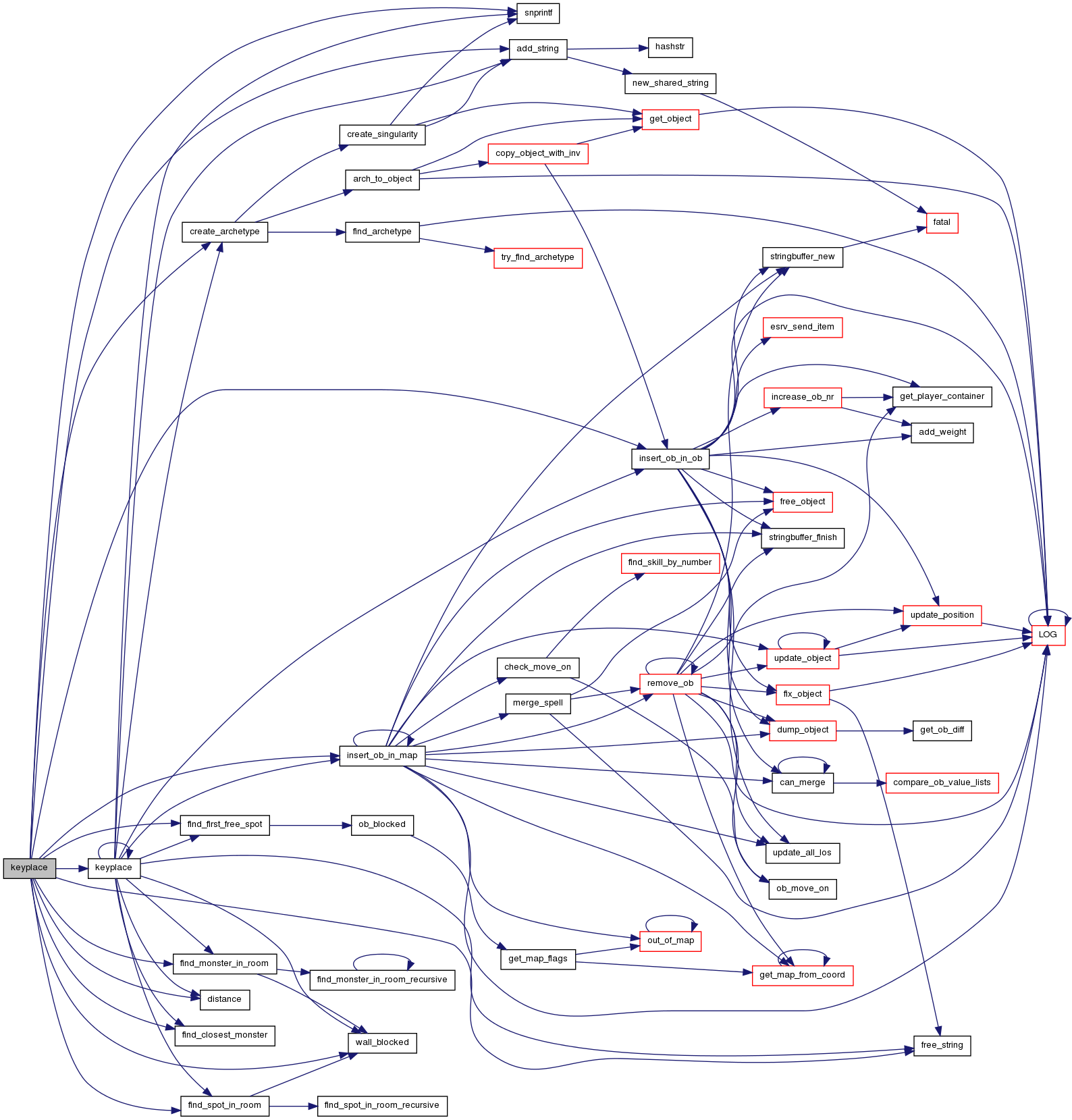

| void lock_and_hide_doors | ( | object ** | doorlist, |
| mapstruct * | map, | ||
| int | opts, | ||
| RMParms * | RP | ||
| ) |
Locks and/or hides all the doors in doorlist, or does nothing if opts doesn't say to lock/hide doors.
Note that some doors can be not locked if no good spot to put a key was found.
- Parameters:
-
doorlist doors to list. NULL-terminated. map map we're working on. opts options. RP map parameters.
- Todo:
- document opts. Isn't it part of RP?
Definition at line 952 of file treasure.c.
References add_string(), create_archetype(), DOORED, FLAG_REMOVED, free_object(), HIDDEN, insert_ob_in_map(), keyplace(), NO_PASS_DOORS, QUERY_FLAG, remove_adjacent_doors(), remove_ob(), retrofit_joined_wall(), and snprintf().
Referenced by place_treasure().
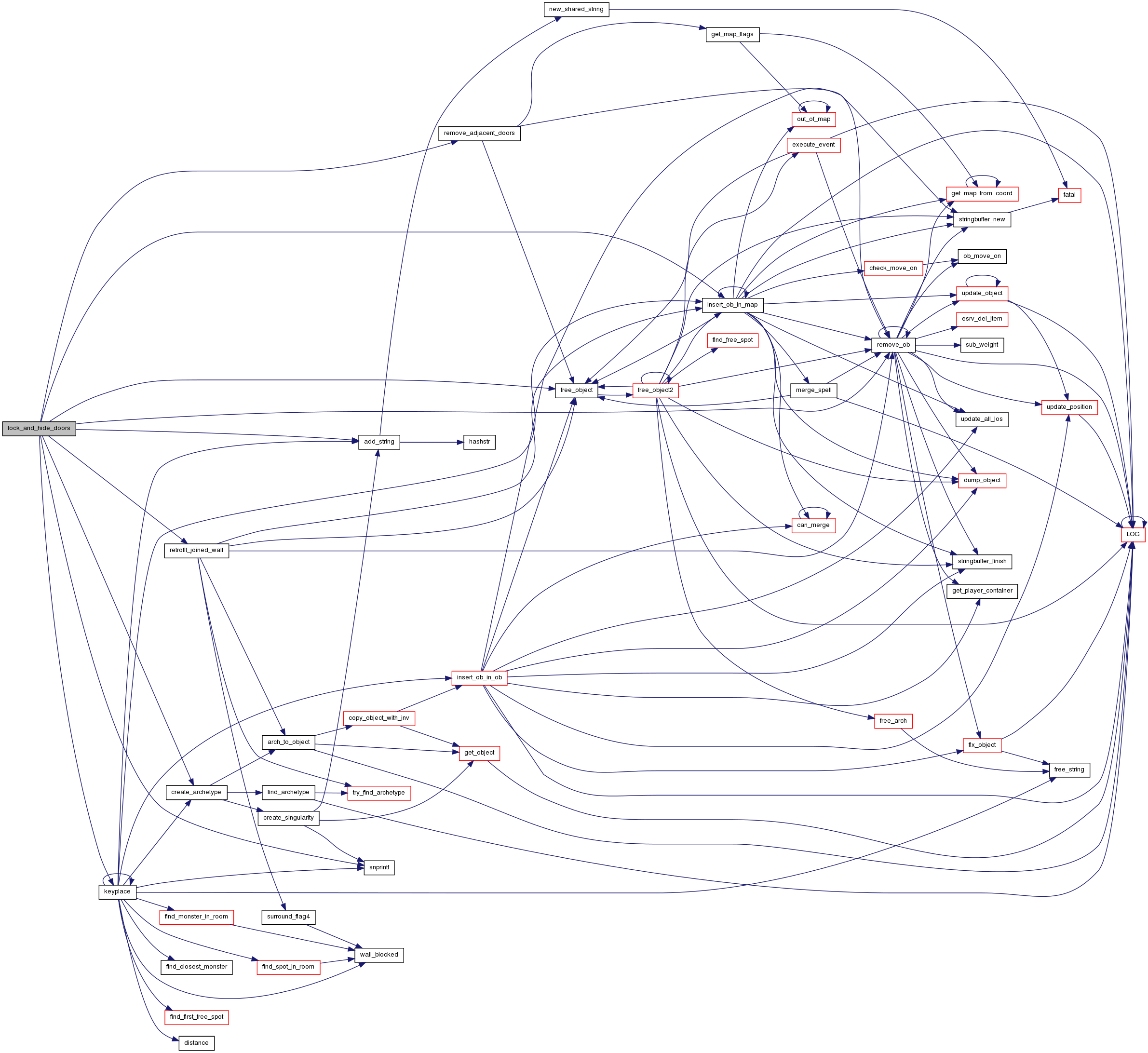
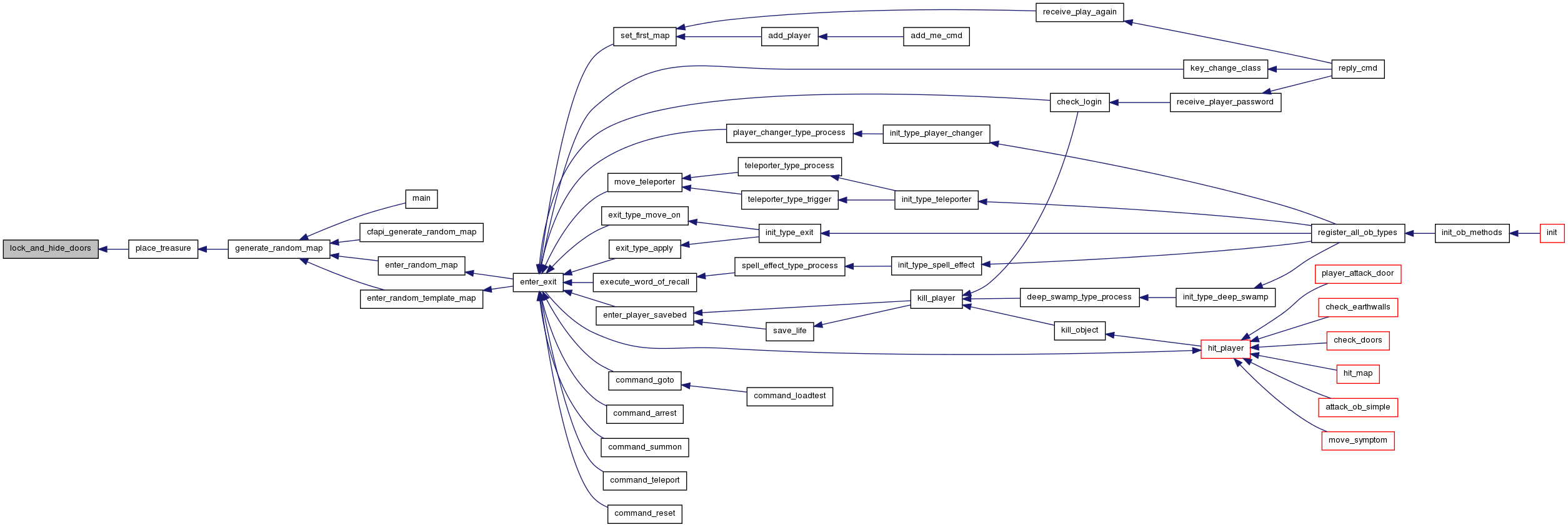
| object* place_chest | ( | int | treasureoptions, |
| int | x, | ||
| int | y, | ||
| mapstruct * | map, | ||
| mapstruct * | style_map, | ||
| int | n_treasures, | ||
| RMParms * | RP | ||
| ) |
Put a chest into the map.
near x and y, with the treasure style determined (may be null, or may be a treasure list from lib/treasures, if the global variable "treasurestyle" is set to that treasure list's name
- Parameters:
-
treasureoptions options. x y around which spot to put treasure. map map to put on. style_map unused. n_treasures ? RP parameters the map was generated from.
- Returns:
- inserted chest, NULL for failure.
- Todo:
- document treasureoptions. Clean parameters. Check meaning of chest hp's field.
Definition at line 232 of file treasure.c.
References add_string(), arch_to_object(), BC_RANDOM, copy_object(), create_archetype(), RMParms::difficulty, find_first_free_spot(), find_style(), find_treasurelist(), free_object(), freearr_x, freearr_y, insert_ob_in_map(), insert_ob_in_ob(), keyplace(), KEYREQUIRED, PASS_DOORS, pick_random_object(), snprintf(), TRAPPED, and wall_blocked().
Referenced by place_treasure().
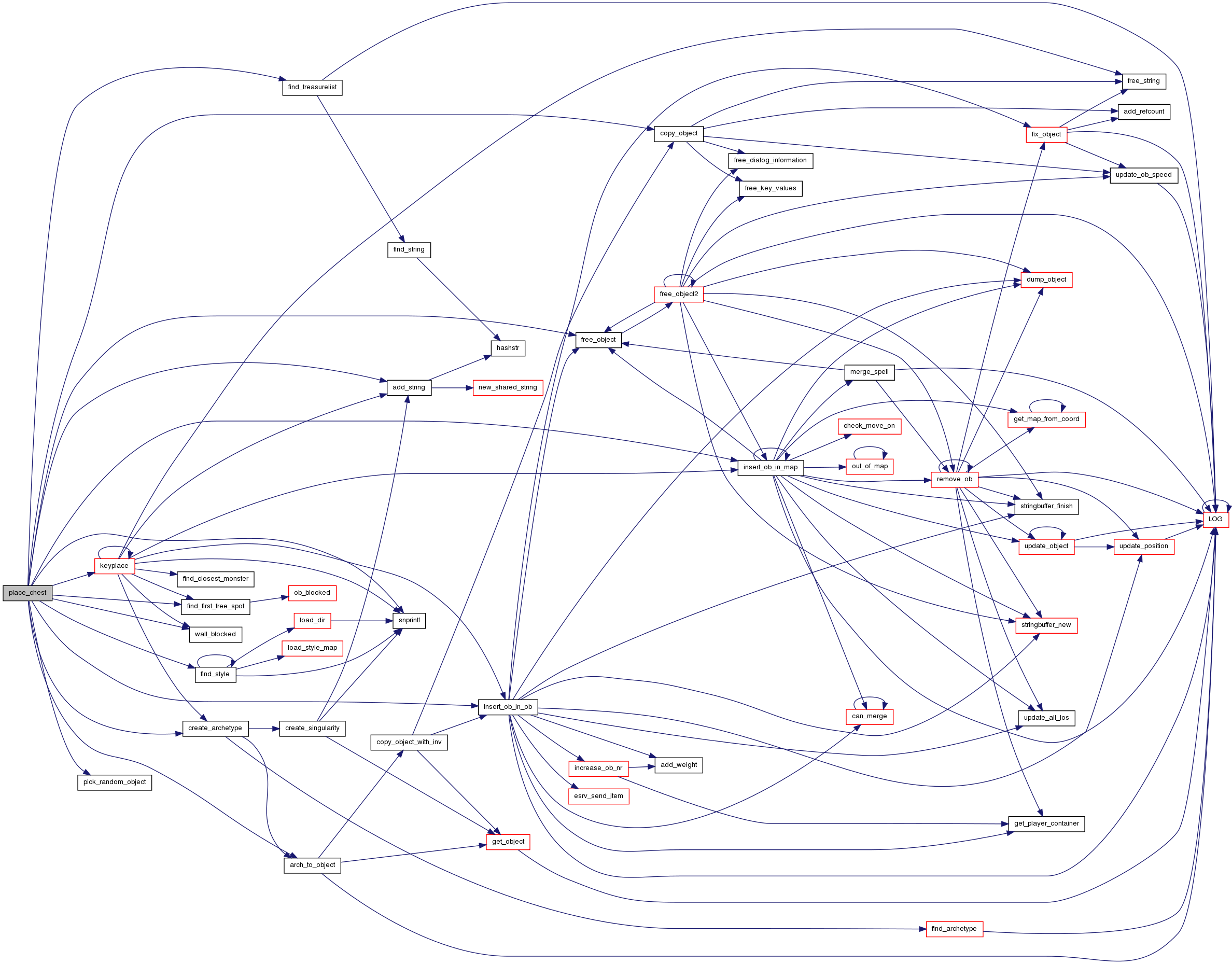
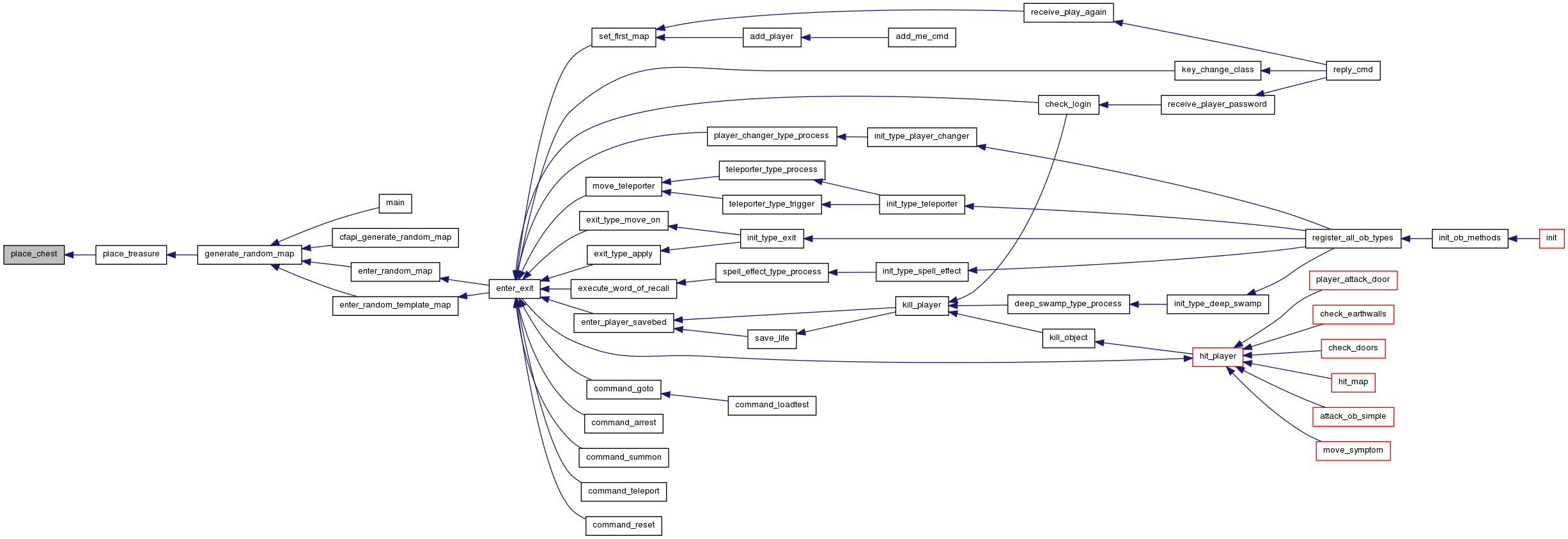
| void place_treasure | ( | mapstruct * | map, |
| char ** | layout, | ||
| char * | treasure_style, | ||
| int | treasureoptions, | ||
| RMParms * | RP | ||
| ) |
Place treasures in the map.
map, (required) layout, (required) treasure style (may be empty or NULL, or "none" to cause no treasure.) treasureoptions (may be 0 for random choices or positive)
- Parameters:
-
map where to insert to. layout layout the map was generated from. treasure_style treasure style. May be empty or NULL for random style, or "none" for no treasures. treasureoptions treasure options. RP random map parameters.
- Todo:
- flags for treasureoptions.
Definition at line 101 of file treasure.c.
References BC_RANDOM, CONCENTRATED, RMParms::difficulty, DOORED, find_doors_in_room(), find_enclosed_spot(), find_style(), HIDDEN, LAST_OPTION, lock_and_hide_doors(), RMParms::map_layout_style, ONION_LAYOUT, place_chest(), RICH, snprintf(), SPARSE, SPIRAL_LAYOUT, SQUARE_SPIRAL_LAYOUT, surround_by_doors(), RMParms::symmetry_used, RMParms::total_map_hp, wall_blocked(), RMParms::Xsize, and RMParms::Ysize.
Referenced by generate_random_map().
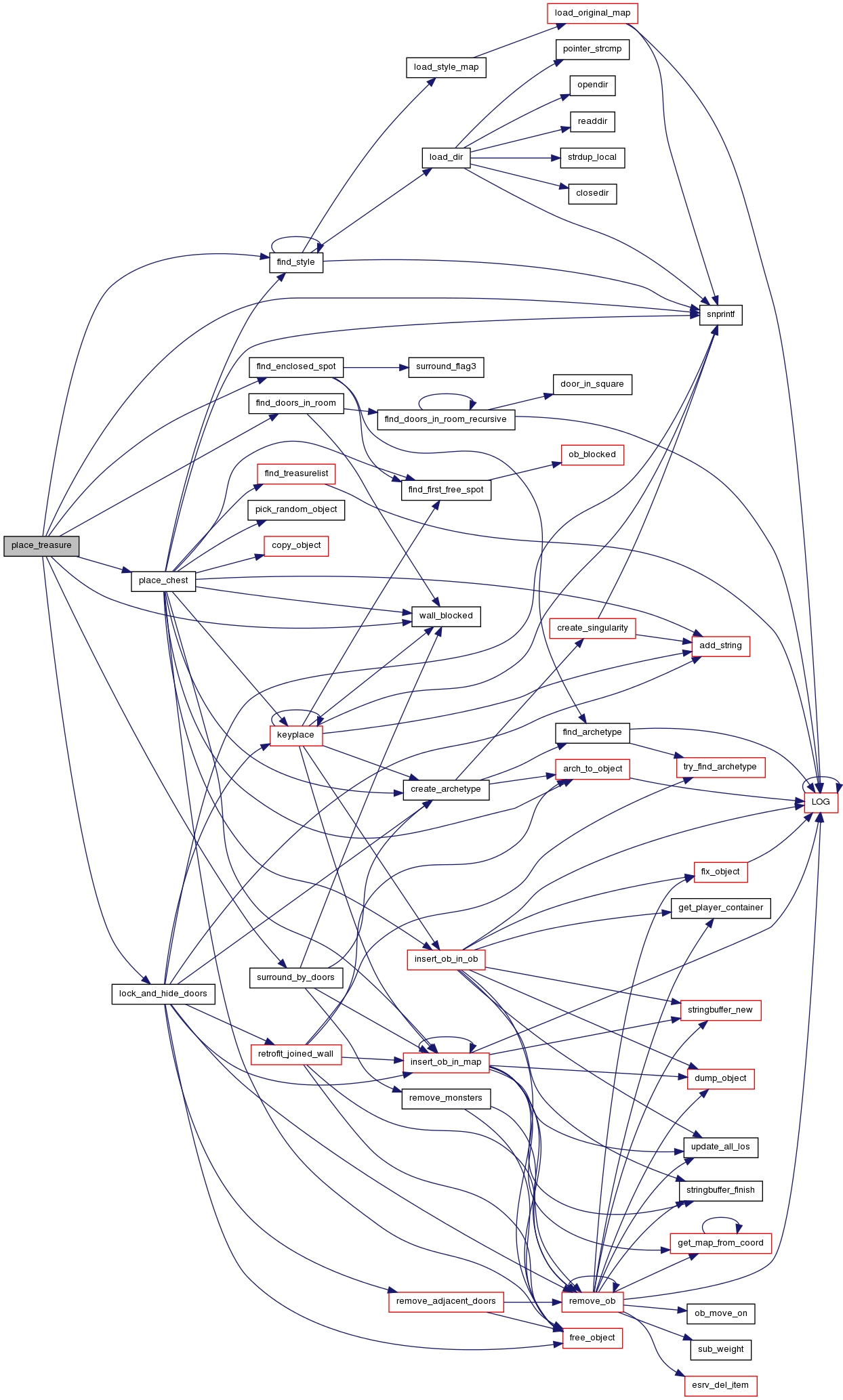
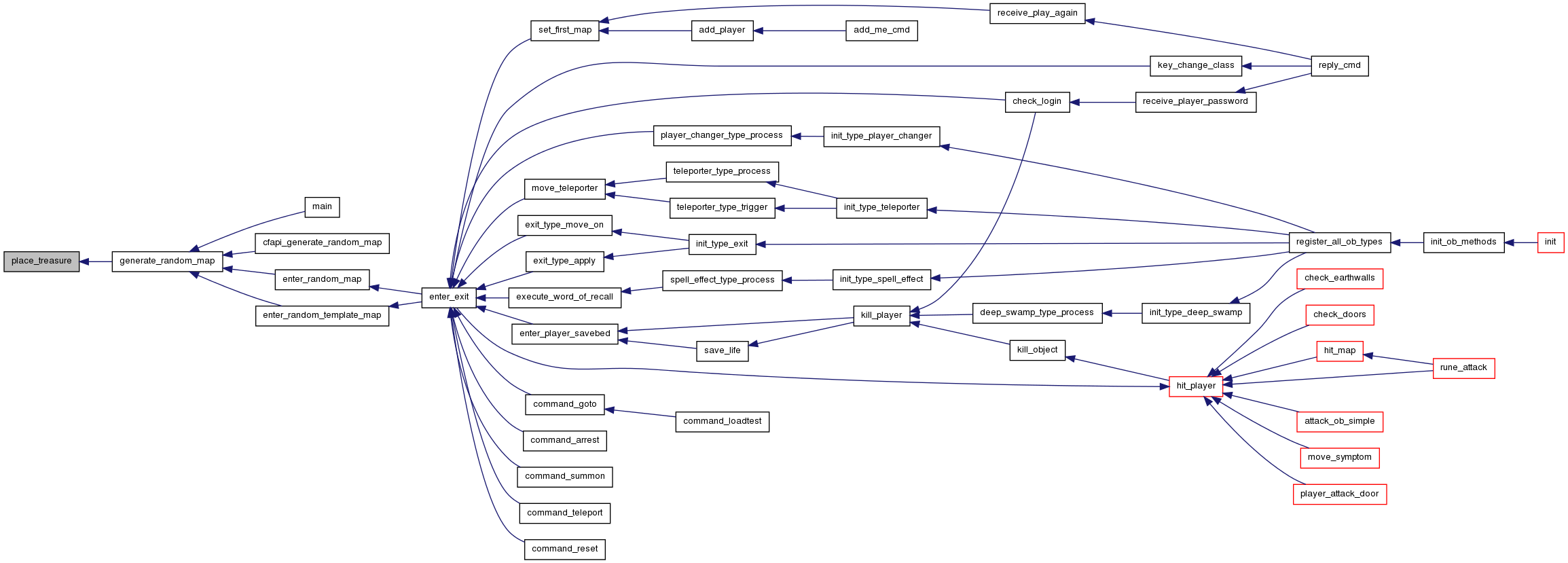
| static void remove_adjacent_doors | ( | object * | door | ) | [static] |
This removes any 'normal' doors around the specified door.
This is used for lock_and_hide_doors() below - it doesn't make sense to have a locked door right behind a normal door, so lets remove the normal ones. It also fixes key placement issues.
- Parameters:
-
door door around which to remove unlocked doors.
Definition at line 910 of file treasure.c.
References DOOR, flags, free_object(), freearr_x, freearr_y, get_map_flags(), GET_MAP_OB, P_IS_ALIVE, P_OUT_OF_MAP, and remove_ob().
Referenced by lock_and_hide_doors().
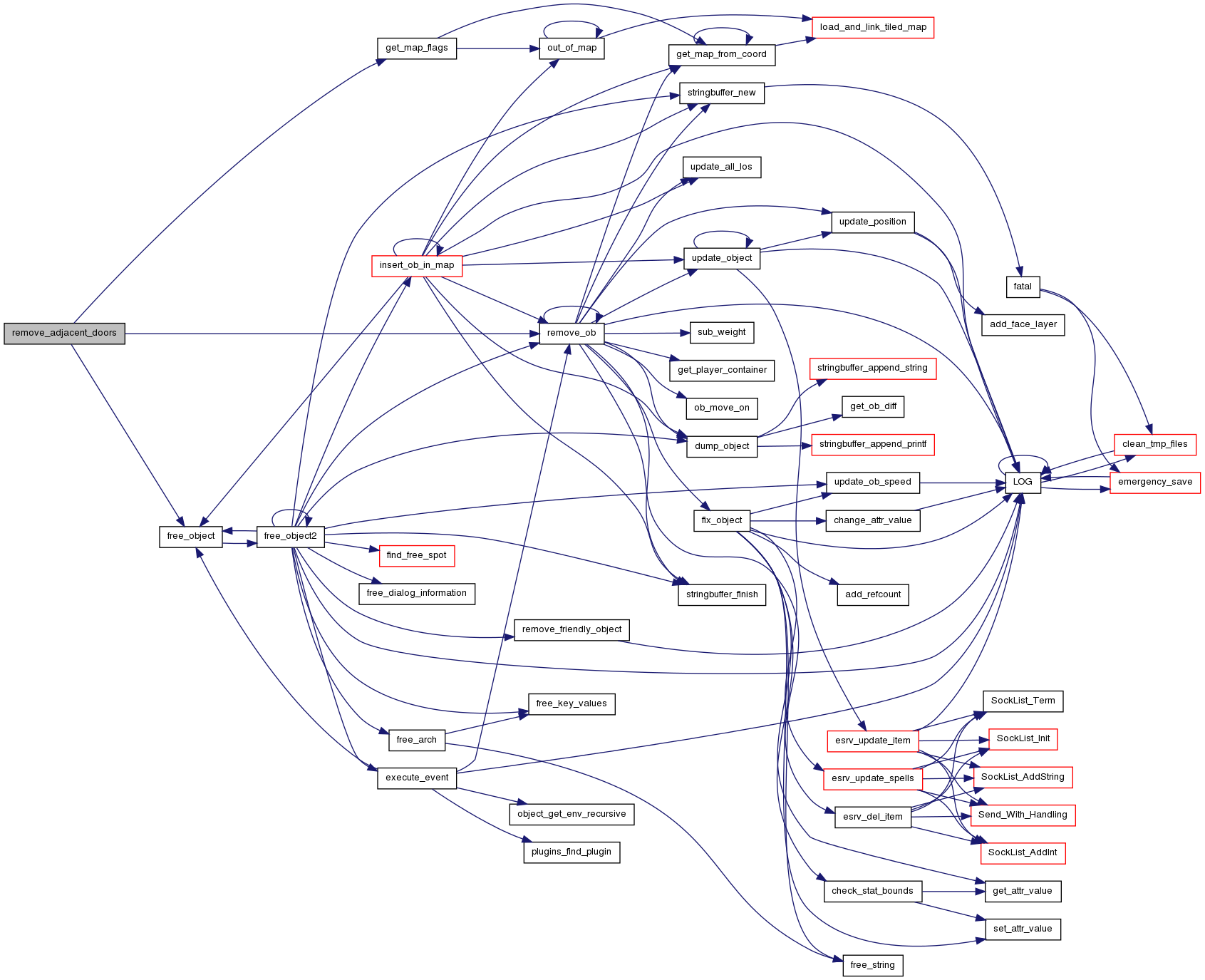

| void remove_monsters | ( | int | x, |
| int | y, | ||
| mapstruct * | map | ||
| ) |
Remove living things on specified spot.
- Parameters:
-
x y map where to remove.
Definition at line 722 of file treasure.c.
References FLAG_ALIVE, free_object(), GET_MAP_OB, QUERY_FLAG, and remove_ob().
Referenced by surround_by_doors().
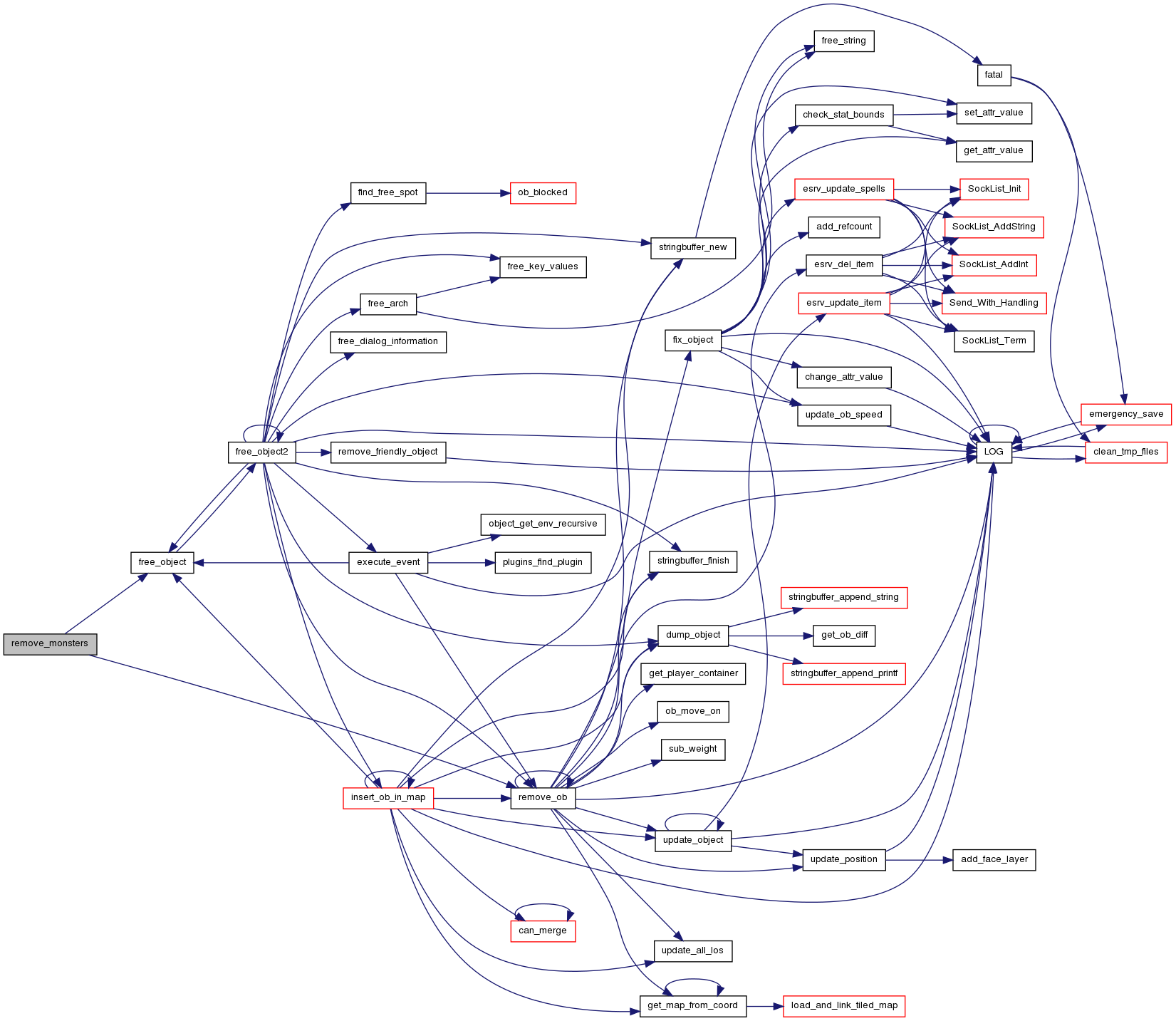

| static object ** surround_by_doors | ( | mapstruct * | map, |
| char ** | layout, | ||
| int | x, | ||
| int | y, | ||
| int | opts | ||
| ) | [static] |
Surrounds the point x,y by doors, so as to enclose something, like a chest.
It only goes as far as the 8 squares surrounding, and it'll remove any monsters it finds.
- Parameters:
-
map map to work on. layout map's layout. x y point to surround. opts flags.
- Returns:
- array of generated doors, NULL-terminated. Should be freed by caller.
- Todo:
- document opts.
Definition at line 755 of file treasure.c.
References create_archetype(), DOORED, freearr_x, freearr_y, insert_ob_in_map(), remove_monsters(), and wall_blocked().
Referenced by place_treasure().
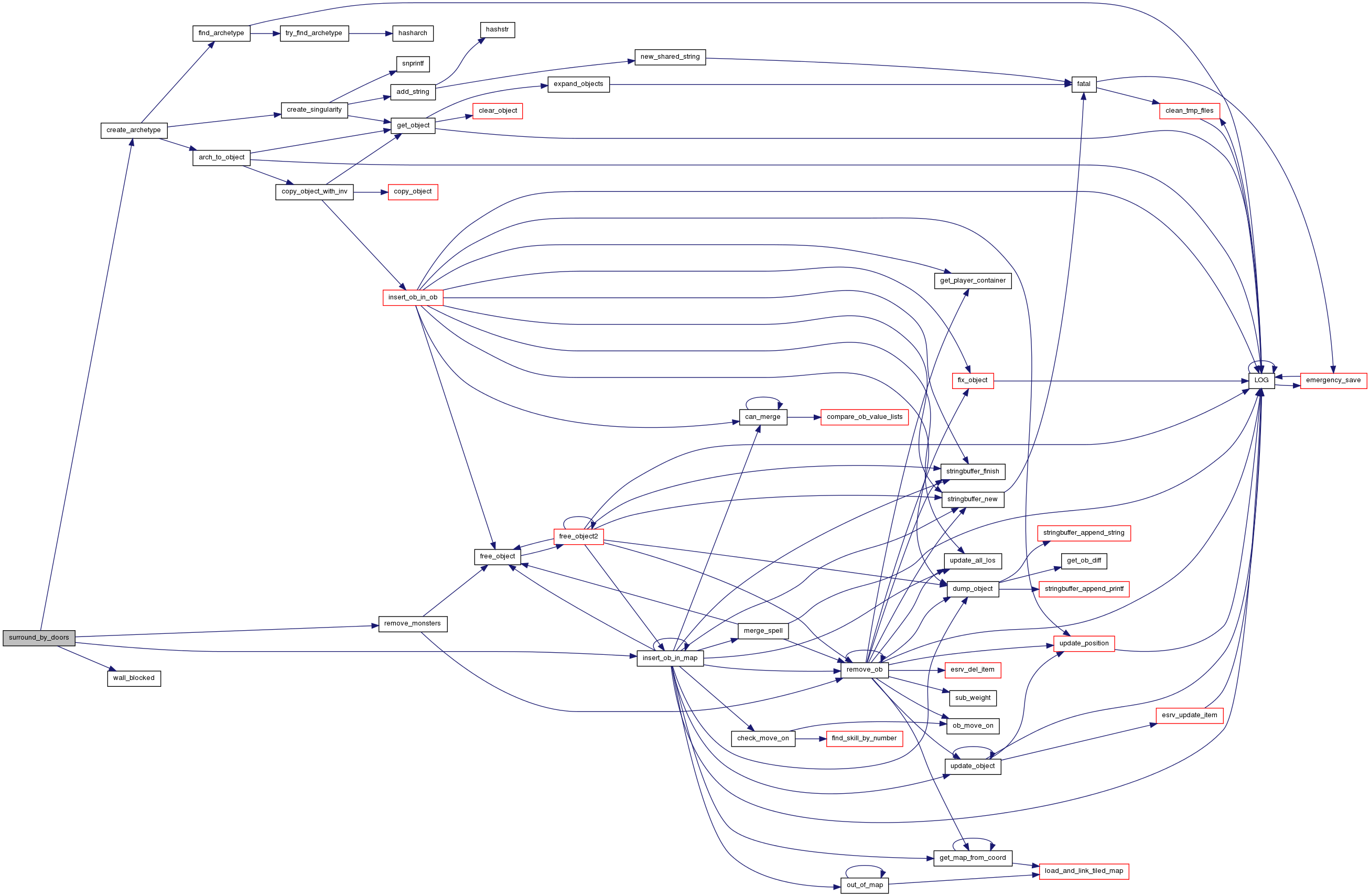
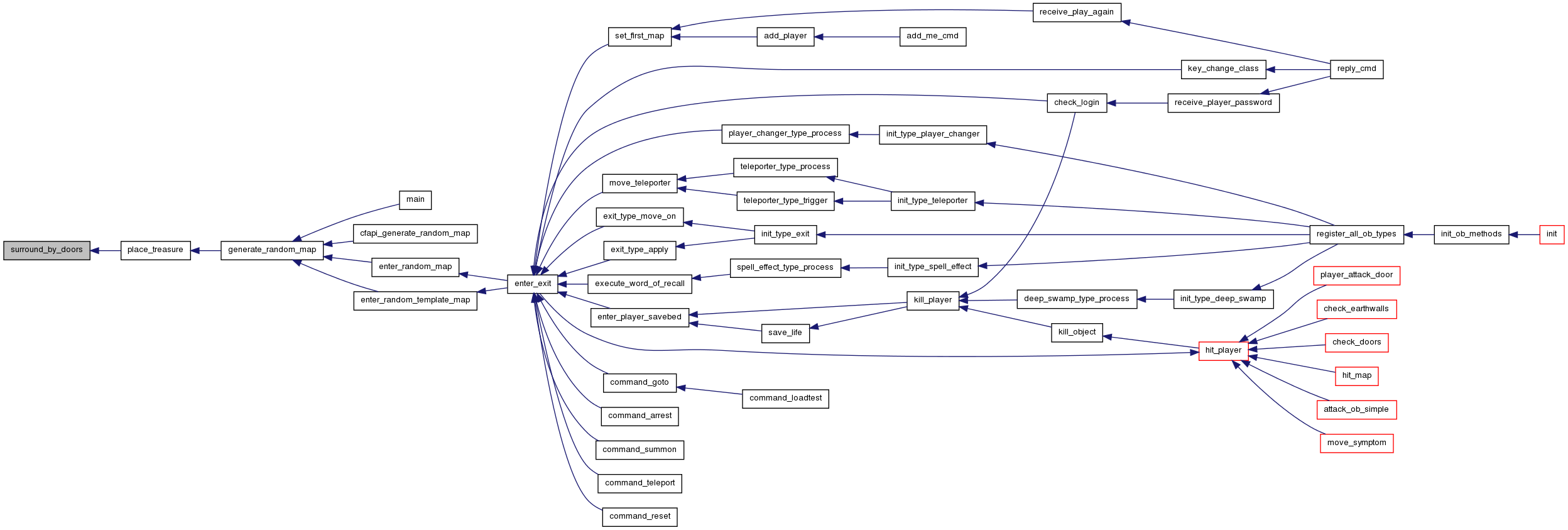
| int wall_blocked | ( | mapstruct * | m, |
| int | x, | ||
| int | y | ||
| ) |
Returns true if square x,y has P_NO_PASS set, which is true for walls and doors but not monsters.
This function is not map tile aware.
- Parameters:
-
m x y map and coordinates to check for.
- Returns:
- non zero if blocked, 0 else.
Definition at line 73 of file treasure.c.
References GET_MAP_MOVE_BLOCK, MOVE_BLOCK_DEFAULT, and OUT_OF_REAL_MAP.
Referenced by find_doors_in_room(), find_monster_in_room(), find_spot_in_room(), keyplace(), place_chest(), place_exits(), place_treasure(), surround_by_doors(), and surround_flag4().

 1.7.6.1
1.7.6.1